The polarization that we live in much of Western society seeks to divide, to make us think that to disagree with what someone else says is to discriminate. We have experienced something like this in Spain, in recent weeks, with the revival of the debate (never closed) on abortion as a result of a campaign, promoted by the state government and some local governments, in which abortion is promoted and is even working to include it as a “constitutional right”.
On this board, any opinion against the elimination of the unborn, against helping mothers..., has been labeled as “discriminatory”, “retrograde” or “anti-feminist”. When having a different opinion and defending it is not to be polarized but to have polarity (opinion, ideas, own sense of life). And the beautiful thing, and this is to be envied, is to be able to dialogue, to have different positions, and to be able to defend them, without feeling attacked or falling into victimhood.
In this line of seeking understanding, videos and articles have appeared that lead the debate to show that abortion is something unwanted, that many times it is carried out because of the precarious situation in which a pregnant woman may be, either for economic reasons, because of vital anguish, lack of information or because there is not enough help offered when she wants to carry a pregnancy to term. All this is very much influenced by the economic interests behind it, since abortion is a very profitable business. But the argumentation to defend the “right to abortion” does not show these circumstances, since the pro-abortion story is different. It goes along the line of making visible that there is little help to exercise freedom and be able to terminate a pregnancy, so they have developed a tool to inform through the web “abortion rights".“quieroabortar.org”This is supported by the Ministry of Health and Equality, in order to be able to have an abortion depending on the autonomous community where you live. They imply that it is an impossible task to carry out this practice in Spain, when 106,172 abortions are performed per year. Or that the 80% is carried out in private centers, without saying that these centers are subsidized with public money. And to consolidate the argument they propose to make this practice a constitutional right.
To understand this biased stance, lacking in dialogue and far from reality, it is worth watching some videos such as the one by Juan Soto Ivars, the one by Chapu Apaolaza or reading the article by Ana Iris Simón, in which she quotes Leire Navaridas, who has jumped into the news. She is “mother of three wonderful children and founder of AMASUVE, a non-political and non-denominational association for the Support and Visibilization of post-abortion trauma”, as she explains in her article. web. This feminist had an abortion in 2008, as she testifies in multiple videos (as in this interview with Vozpópuli ). Her decision to interrupt her daughter's life, because she was overwhelmed by the situation of not wanting to accept motherhood, because she was badly advised and because in her situation she did not see any other solution, did not affect her at first, she came out as if she had done “the English”. But when she realized that she had not emptied herself of a “jumble of cells”, but of a living being, the result of having received therapy for vertigo. Years later, in addition to founding the association for the accompaniment of pregnant women, she became a volunteer for Red Madre. This is a “solidarity network of support, advice and accompaniment for women to overcome any conflict arising from an unexpected pregnancy”.
The message is clear, the abortion debate is not closed. We must be open to dialogue and build bridges to understand the circumstances in which many pregnant women live. Faced with this delicate situation, we must offer alternatives of all kinds to help women who want to carry out their pregnancy. As the recently created website explains quierosermadre.org, which tries to facilitate the desire to carry out motherhood. In this way, when an unexpected pregnancy comes, there will be more chances of not being forced to undergo the most violent obstetric operation that can be for the woman and lethal for the new human being that is on the way.








